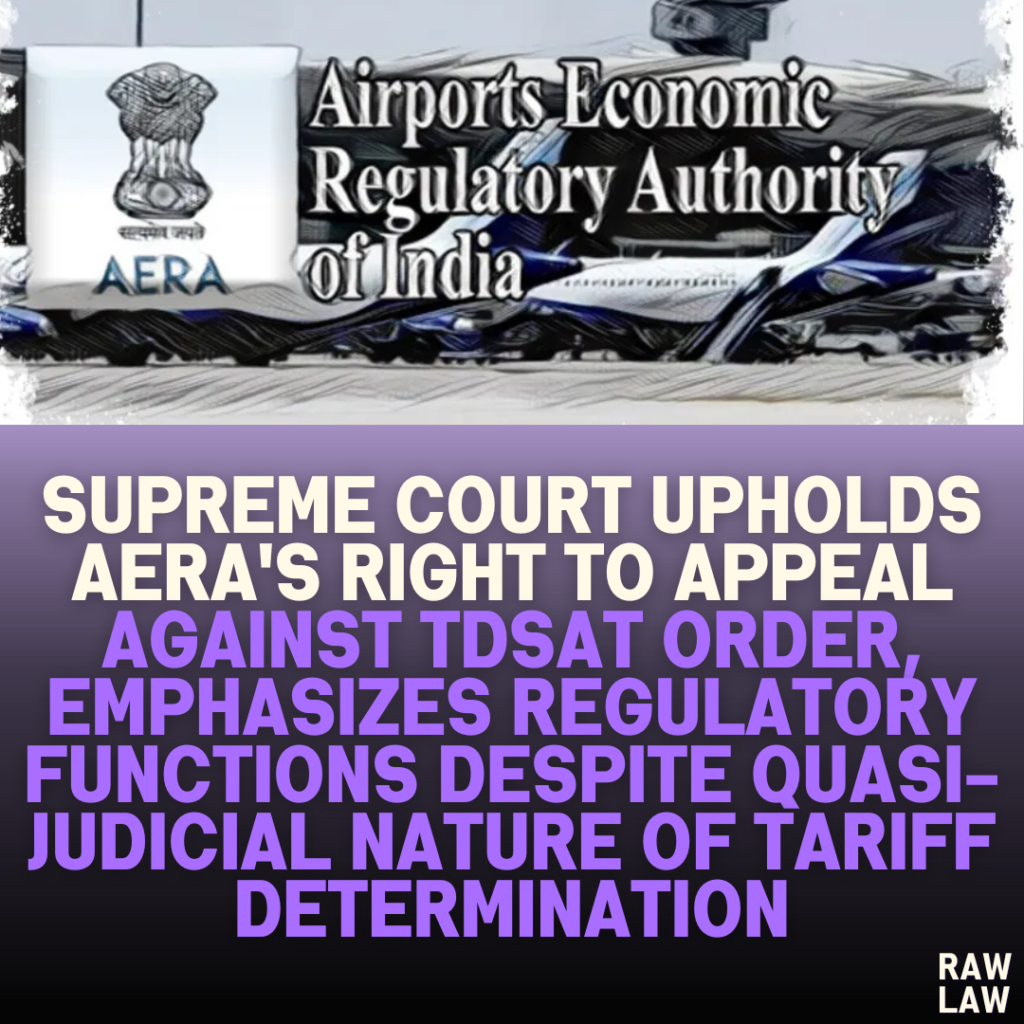Court’s Decision
The Supreme Court ruled that the Airports Economic Regulatory Authority (AERA) has the right to file an appeal against the order of the Telecom Disputes Settlement and Appellate Tribunal (TDSAT) under Section 31 of the AERA Act. The Court held that AERA can contest an appeal against its own order determining tariff for aeronautical services, stating that such determination is not purely quasi-judicial but also regulatory in nature.
Facts
AERA, established under the AERA Act, 2008, is responsible for determining tariffs for aeronautical services at airports, among other functions. A dispute arose when AERA filed an appeal against an order of TDSAT, challenging its decision regarding tariff determination. The respondents argued that AERA, being a quasi-judicial body, could not file an appeal against its own order. They contended that tariff determination is a quasi-judicial function, and allowing AERA to contest the appeal would result in bias and conflict of interest.
Issues
- Whether AERA has the right to contest an appeal against its order determining aeronautical tariffs before TDSAT.
- Whether AERA can file an appeal against the order of TDSAT before the Supreme Court under Section 31 of the AERA Act.
Petitioner’s Arguments
The respondents argued that AERA, as a tariff-fixing authority, is a quasi-judicial body and therefore cannot be considered an “aggrieved party” eligible to file an appeal. They relied on the principle that authorities exercising quasi-judicial functions should not defend their orders in appeal, citing precedents from the Supreme Court that prohibited judicial authorities from defending their own decisions.
Respondent’s Arguments
AERA, represented by the Attorney General and Solicitor General, argued that it was not solely a quasi-judicial body but also performed regulatory functions. They claimed that AERA has a vested interest in the outcome of the tariff determination and, therefore, should be allowed to contest appeals to safeguard public and regulatory interests.
Analysis of the Law
The Court analyzed the nature of AERA’s functions and differentiated between purely adjudicatory and regulatory functions. It emphasized that while tariff determination may involve elements of quasi-judicial activity, it also serves a broader regulatory role that requires AERA to act in the public interest. The Court discussed the evolution of the concept of quasi-judicial functions and noted that modern administrative law often requires regulatory authorities to act judicially without necessarily performing pure adjudicatory tasks.
Precedent Analysis
The Court referred to prior judgments, including PTC India Ltd. v. Central Electricity Regulatory Commission and Sitaram Sugar Co. Ltd v. Union of India, to emphasize that tariff determination by regulatory authorities often carries both adjudicatory and legislative elements. The Court also cited Competition Commission of India v. Steel Authority of India, which clarified that regulatory bodies performing quasi-judicial functions can participate in appeals, particularly where public interest and regulatory policies are at stake.
Court’s Reasoning
The Court reasoned that barring AERA from defending its tariff determination would be counterproductive to its role as a regulator responsible for public interest. It held that regulatory authorities are not precluded from contesting their decisions when the order impacts broader regulatory frameworks. The Court further stated that the law does not prohibit quasi-judicial authorities from filing appeals, especially when their regulatory mandate is intertwined with public interest considerations.
Conclusion
The Supreme Court upheld the maintainability of AERA’s appeal against TDSAT’s order. It held that AERA’s role extends beyond pure adjudication and includes vital regulatory functions, which justify its right to file an appeal. The Court clarified that AERA’s interest in the appeal is aligned with its regulatory responsibilities, and its participation in appellate proceedings is necessary for ensuring sound regulatory oversight.
Implications
This judgment has significant implications for regulatory bodies in India. It broadens the scope of regulatory authorities to engage in appellate processes, even when their functions involve quasi-judicial elements. The decision strengthens the position of regulators like AERA, enabling them to defend their determinations in court to protect public and regulatory interests.
